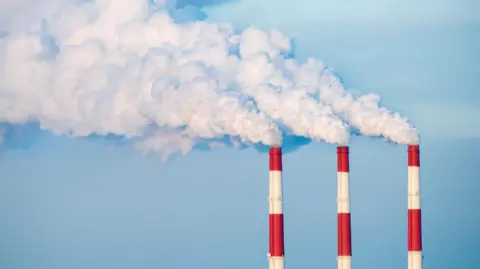Ireland's greenhouse emissions lowest in 30 years
 Getty Images
Getty ImagesGreenhouse gas emissions in the Republic of Ireland are at their lowest level in 30 years, according to the latest figures from the Environmental Protection Agency (EPA).
Almost every sector showed a fall in 2023, contributing to an overall reduction of 6.8%.
It is the largest reduction outside of years when the economy was in recession and is the second consecutive annual reduction.
But the country is "still well off track" to meet EU and national 2030 targets, the EPA said.
Laura Burke, EPA director general, said the findings were "significant" and signalled "the impact of climate action and decarbonisation measures across Ireland's economy and society".
The biggest decrease was seen in the energy sector, where emissions fell by 21.6%.
That was largely due to a 12-fold increase in imported electricity, an increase in the share of renewable energy and a reduction in the use of coal, oil and peat.
How much did emissions fall in different sectors?
Emissions from agriculture fell by 4.6% after an 18% reduction in fertiliser nitrogen use, reduced lime application and overall reduction in non-dairy livestock.
Residential sector emissions decreased by 7%, with high fuel prices and a milder winter playing a part.
More than 30,000 heat pumps were installed in homes in Ireland in 2023, bringing the total to 120,000.
However emissions from transport increased marginally by 0.3%.
 Getty Images
Getty Images"We see the impact of more renewables and interconnection powering electricity, less fossil fuel use in home heating, reduced nitrogen fertiliser use in agriculture and more biofuel in transport," Ms Burke added.
"The data indicates a move towards reducing greenhouse gas emissions at the scale and pace required to meet our climate ambition of a 51% reduction by 2030.
"However, while these are positive results for the year 2023, we are still well off track in terms of meeting EU and national 2030 targets.
"We need to maintain and further build momentum."
